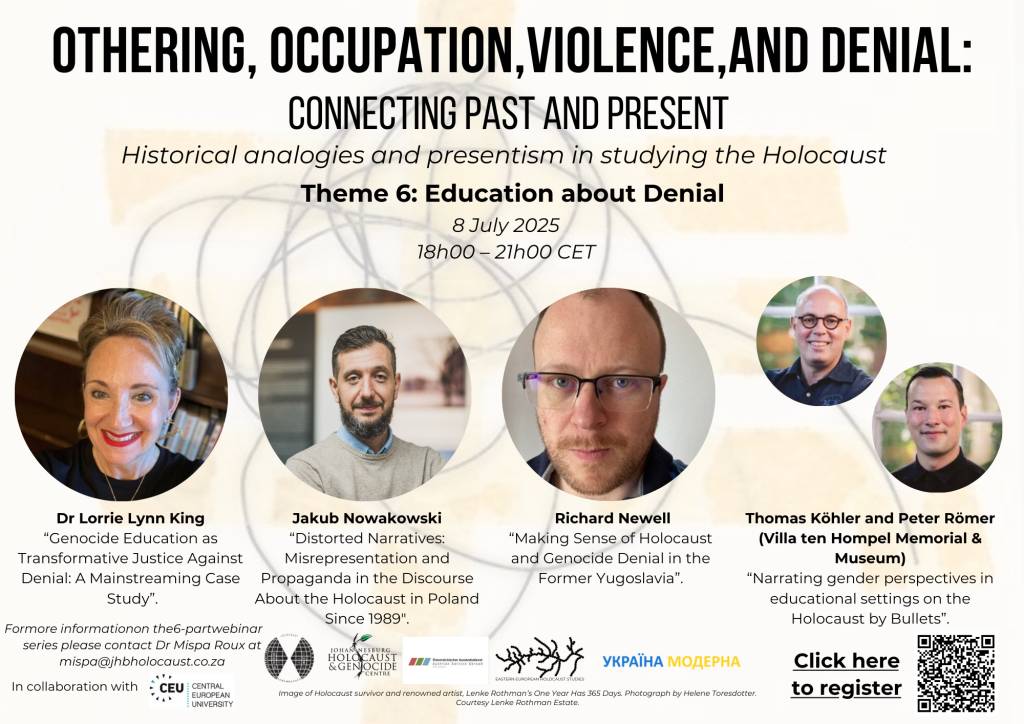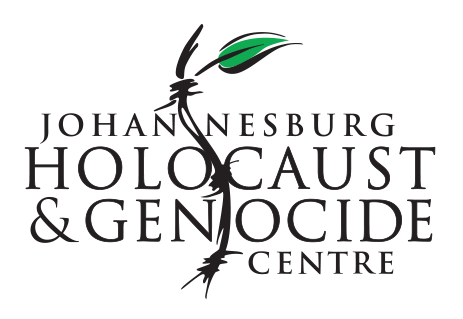
8 July 2025 @ 6:00 pm – 9:00 pm
Studies: Interdisciplinary Journal of the Babyn Yar Holocaust Memorial Center (EEHS), Ukraina Moderna website (UM), and Austrian Service Abroad (ASA) on the theme of “Othering, Occupation, Violence, and Denial”. Topics that will be engaged with under the central theme include the way in which historical analogies and presentism in studying the history of the Holocaust are used to foster deeper understanding and critical thinking about the Holocaust, current armed conflicts and the rise of hate speech. Ways in which oversimplifications, misrepresentations, distortions, and denial of these topics can be challenged and safeguarded against will also be grappled with, alongside testimonies, resistance, education, remembrance, and the collection and preservation of history.
This sixth and final webinar in the series deals with the theme of Education about Denial featuring speakers: Dr Lorrie Lynn King on “Genocide Education as Transformative Justice Against Denial: A Mainstreaming Case Study”, Jakub Nowakowski on “Distorted Narratives: Misrepresentation and Propaganda in the Discourse About the Holocaust in Poland Since 1989″, Richard Newell on “Making Sense of Holocaust and Genocide Denial in the Former Yugoslavia”, and Thomas Köhler and Peter Römer (Villa ten Hompel Memorial & Museum) “Narrating gender perspectives in educational settings on the Holocaust by Bullets”.
For nearly thirty years, Dr. Lorrie Lynn King has worked across applied, academic, and philanthropic sectors in global health and humanitarian aid. Her career spans 40 countries and fifteen Indigenous nations, collaborating with organizations like CARE International, the American Red Cross, the Carter Center, and UMCOR. Her community health programs, including HIV/AIDS Case Management Training in post-genocide Rwanda and Coffee Klatch Psychosocial Support for survivors of sexual violence, have been recognized by the Rwandan Ministry of Health and the CDC. Lorrie’s pioneering work in menstrual equity earned her a spot in CNN’s Top Ten Inspiring Women of 2014 (“The Stigma Stopper”), along with honors from the Georgia State House of Representatives, Rotary International, and Global Menstrual Hygiene Day. As a PhD scholar in Holocaust and Genocide Studies, she researches global resistance and reparation, Nazi resettlement in the U.S., and Jewish Drag and Gangsterism. She teaches Public Health, Social Justice, and Religion at Emory University and Agnes Scott College, serving as faculty advisor for the Jewish Student Union, “The Jew Crew”. Lorrie holds a BA in International Development from Oglethorpe University, an MPH from the University of Liverpool, and is completing her PhD at Gratz College. She has certifications in Health and Human Rights from Harvard, Health in Prisons from Johns Hopkins, and Mental Health First Aid. Additionally, she is a certified yoga teacher and ordained by the Universal Life Church. In her spare time, she enjoys reading, film, black coffee, red wine, and laughter.
Jakub Nowakowski was born and raised in Kazimierz, the former Jewish district of Kraków. Coming from a non-Jewish family that lived in Kazimierz for generations, from an early age he was compelled to research the history of his neighbourhood. In 2007 he graduated from the Department of Jewish Studies at the Jagiellonian University, where he wrote a thesis on Jewish resistance in Kraków during the Second World War. His interest in Jewish history and Polish-Jewish relations led him to become a student volunteer and a member of Polish-American-Jewish Alliance for Youth Action (PAJA). The goal of the organisation was to create opportunities for dialogue between young Poles, Jews and Americans. In 2005 Nowakowski joined the staff of the newly open (2004) Galicia Jewish Museum in Kraków. In 2006 he joined the Museum’s Education Department, and in 2008 he became its manager. In 2010, after an international competition, Nowakowski was appointed as the director of the Galicia Jewish Museum in Kraków, Poland. He served in this role for 13 years. In 2023 he was appointed as the director of the Cape Town Holocaust & Genocide Centre. Jakub Nowakowski is the co-author of a number of Museum publications, including Poland: A Jewish Matter, and the proceedings of a symposium exploring contemporary Jewish life in Poland, marking the close of Jewish programming for Polska! Year. He is also a curator of the Museum exhibitions including “Fighting for Dignity”, “Jewish Resistance in Kraków, A City Not Forgotten”, “Memories of Jewish Lwów and the Holocaust”, “The Girl in the Diary”, and “Searching for Rywka from Łódź ghetto”. The exhibitions he has curated have been presented in Poland and internationally.
Richard Newell is a PhD candidate, based in Sarajevo, studying at the Karl-Franzens-Universität Graz (Austria). His previous research and publications have been on the memory conflicts surrounding the genocide in Srebrenica and Rwanda. His current research is focused on the memorialisation of WWII in the Balkans, with particular focus on the Jasenovac Concentration Camp. He is co-producer of the Aegis Trust’s “Peace at Risk in Bosnia” podcast and member of the Sarajevo Security Conference.
Thomas Köhler is the second deputy director of the Villa ten Hompel Memorial and Museum in Münster(Germany) and an associate researcher at the University of Münster. His research, education and exhibitions focus on the history of National Socialism and the Holocaust, police history in the 20th century and the culture of remembrance after 1945. As a partner of the United States Holocaust Memorial Museum in Washington, D.C., he is developing educational outreach programs for their German-language traveling exhibition “Some Were Neighbors: Collaboration and Complicity in the Holocaust.” Together with the Israeli Holocaust Memorial Yad Vashem in Jerusalem, he co-developed the didactic folder “Entscheiden und Handeln” regarding the synagogue massacre in the eastern Polish city of Bialystok in June 1941. He is writing his doctoral thesis on the ideological radicalization of Nazi police officers and is the author and (co-)editor of An der Seite der SS. Die deutsche Polizei im Dritten Reich (expected to be published in 2025), Polizei und Holocaust. Eine Generation nach Christopher Brownings Ordinary Men (2023), Lublin-Majdanek. Das Konzentrations- und Vernichtungslager im Spiegel von Zeugenaussagen, 2nd edition (2014), ‘Nicht durch formale Schranken gehemmt’. Die deutsche Polizei im Nationalsozialismus (2012).
Born in Hamburg in 1984, Peter Römer moved to Münster to study political science, modern and contemporary history, and public law at the University of Münster. His experience abroad at the University of Warsaw sensitized him to issues of memory culture and political history. He graduated with a Master of Arts degree. He has worked as a as a lecturer at the University of Applied Sciences for Police and Public Administration in North Rhine-Westphalia and the German Police University and at the University of Münster. Römer completed his traineeship at the Villa ten Hompel memorial and museum from 2016 to 2018 and has been working here as an educational and Research Associate since 2019. He conceived and planned the international conference “Facing Police and Holocaust” (2019). He was project manager for the projects “Den Tätern auf der Spur” (On the Trail of the Perpetrators) (2020-2022) and “Das geht mich ja was an!” (That’s My Business!) (2021-2022), both funded by the EVZ Foundation. He is responsible for the content and organization of education of adults at Villa ten Hompel (particularly in the area of professional training for police, fire department, and judicial personnel, students, and multipliers). He therefore designs projects for democracy and human rights education, anti-Semitism prevention, the history of the police under National Socialism, and the current development of the executive and judicial branches. He also conducts research on police history and how people become perpetrators. Römer has been deputy director of the historical site since 2023.

